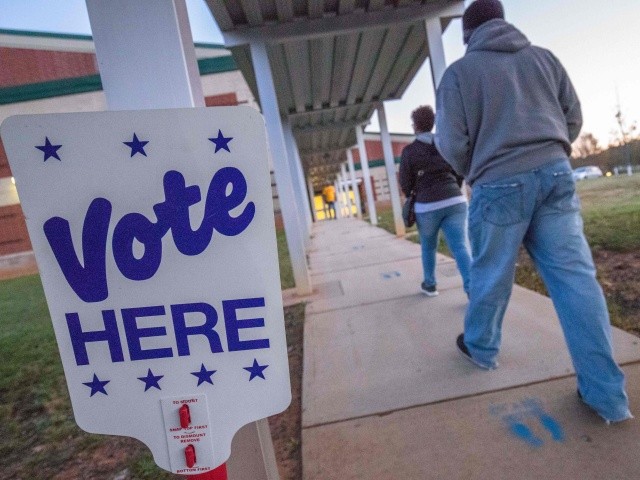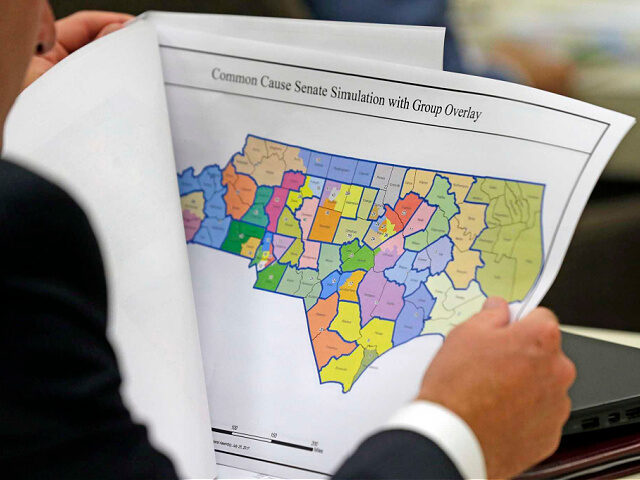The North Carolina Supreme Court on Friday ruled that there is no legal mechanism to judge claims of “partisan gerrymandering,” giving the Republican-controlled state legislatures the ultimate authority to draw congressional maps without court intervention. In a separate case, the court reversed a decision that previously tossed out a voter identification law.
“There is no judicially manageable standard by which to adjudicate partisan gerrymandering claims,” the court concluded in a 5-2 decision of the Harper v. Hall case. “Courts are not intended to meddle in policy matters.”
The 218-page decision comes months after the court threw out legislative maps drawn by the Republican-led chambers of Congress in the Tar Heel State.
In December — after voters flipped the court red in the midterm elections giving Republicans a 5-2 majority — the outgoing Democrat-controlled Supreme Court blocked the maps and ordered the legislative bodies to create new ones, the Associated Press noted at the time.
The same month, it also blocked a law mandating voters present photo identification at the ballot box in the Holmes v. Moore case, finding it breached multiple classes of the North Carolina constitution. The court revisited both cases after the new majority took control in January, leading to reversals in both decisions.
“In its decision today, the Court returns to its tradition of honoring the constitutional roles assigned to each branch,” Friday’s Harper v. Hall ruling read.
In the Holmes v. Moore case, the court ruled 5-2 that the “[p]laintiffs here have failed to prove beyond a reasonable doubt that S.B. 824 was enacted with discriminatory intent or that the law actually produces a meaningful disparate impact along racial lines.”

Voters arrive at Waddell Language Academy in Charlotte, North Carolina, shortly after the polls opened on November 3, 2020. (Photo by GRANT BALDWIN/AFP via Getty Images)
Friday’s rulings are a “victory for the rule of law,” said Jason Snead, Honest Elections Project Action’s executive director, in a statement:
Today’s ruling in the North Carolina Supreme Court restoring voter ID, affirming the power of lawmakers to draw legislative maps, and upholding a law requiring felons to complete their full sentences before regaining ballot access is a victory for the rule of law and a recognition of the important, but limited, role of courts in our constitutional system.
Elias, a left-wing election attorney, argued the Harper v. Hall ruling was “a terrible decision.”
“It’s a terrible outcome for democracy and voting rights in North Carolina, but anyone who thinks it’s going to stop us from continuing our fight to protect and expand voting rights and democracy is wrong,” he said during an appearance on MSNBC’s Deadline: White House Friday evening.
In his statement, Snead contended that Elias “spent years treating the North Carolina Supreme Court like a supreme legislature,” adding:
The Court’s former Democratic majority used these hyper-partisan lawsuits to strike down a popular voter ID law, attempt to gerrymander the state for Democrats, and even invented a way for courts to strike down constitutional amendments passed by the people of North Carolina.
The Harper v. Hall case centered on the widely-debated “independent state legislature theory,” a perspective held by many conservatives that the U.S. Constitution grants state legislative bodies the ultimate authority to interpret their election laws. Many proponents of the theory cite Article I, Section 4, Clause 1 of the Consitution.
“The Times, Places and Manner of holding Elections for Senators and Representatives, shall be prescribed in each State by the Legislature thereof; but the Congress may at any time by Law make or alter such Regulations, except as to the Places of chusing Senators,” it reads.
The cases are Harper v. Hall, No. 413PA21, and Holmes v. Moore, No. 342PA19-3, in the North Carolina Supreme Court.

COMMENTS
Please let us know if you're having issues with commenting.